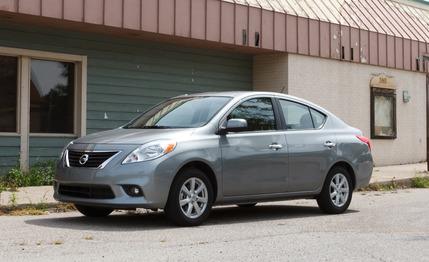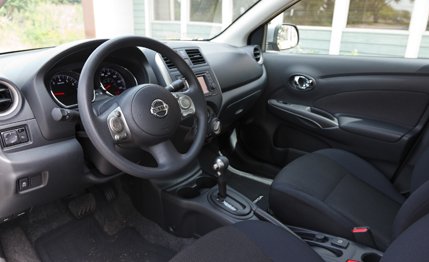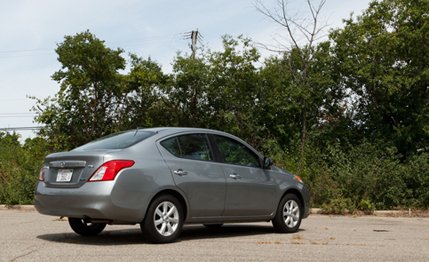
 Short Take Road Test
Short Take Road Test


The ongoing belt-tightening in America has seen small cars move upmarket, with many boasting attractive designs and premium features unheard of in the segment as recent as five years ago. But just as other manufacturers are moving onward and upward, Nissan has taken a few steps back with its 2012 Versa sedan, a car that shoots for (and hits) the bottom of the barrel.
Starting at $11,750, the Versa sedan is aimed at those ramen-budget buyers who prefer the scent and security of a new car—and a factory warranty—to flirting with a used car. This formula isn’t anything new to Nissan or the Versa. The previous generation even offered a stripped-out, radioless sedan for a grand less than this new model. But the last car, in bargain-basement or slightly nicer trim, offered satisfactory performance and dynamics and wasn’t built initially or exclusively to be the least expensive new car on the market—an important distinction between it and the 2012 model.


All 1.6, All the Time
For starters, the 122-hp, 1.8-liter four that was optional in the 2011 sedan has been dropped in favor of a 1.6-liter lineup. The 1.6 is updated slightly for 2012, now getting two fuel injectors per cylinder for what Nissan says is a more efficient burn. Output is essentially unchanged, with the engine putting out 2 more hp for a total of 109 but dropping 4 lb-ft of torque to 107. A continuously variable automatic transmission replaces the previous car’s optional four-speed auto and helps net a decent increase in fuel economy. The Versa is pegged to return 30 mpg in the city and 38 on the highway with the CVT, up 5 mpg in both categories from last year’s auto-equipped 1.6-liter. (With the manual, the car is rated at 27/36.) We saw 33 mpg overall in our CVT-equipped test car.
But the benefits of the 1.6 and CVT come at a hefty cost: the sanity of the car’s occupants. Rarely have we wanted out of a car so badly before we even made it out of our office parking lot. With the motor revving straight to 4800 rpm, the drone from the powertrain is so intense you’d rather listen to your mother-in-law go on about a day of holiday shopping. The Versa won’t be getting you to your destination quickly, either. It took 9.8 seconds to stroll to 60 mph, and it eventually reached the quarter-mile in 17.5 at 81 mph. The 2472-pound sedan stopped from 70 mph in 179 feet, an average performance commanded by a soggy pedal.
Fewer Parts, Less Good
Riding on Nissan’s new global V platform, the Versa has wheelbase and width measurements that are unchanged from last year’s. It is a tad shorter, though, and boasts a trunk that, at 15 cubic feet, is one cube larger. With the new platform, Nissan says it cut about 150 pounds by reducing the number of parts by nearly 20 percent. Perhaps it left out a few too many critical components. The gap between the front wheel and fender makes the Versa look like it’s on stilts, and it handles like it, too. Its stick on the skidpad is a scant 0.76 g, and enthusiastic drivers will quickly succumb to waves of body roll and understeer that have the front tires howling at normal cornering speeds. On the highway, the Versa is nervous and subject to directional changes determined as often by the wind as by the driver.


Things are worse inside, too. The new interior is constructed entirely of concrete-hard plastics, with the only soft materials being the carpet, the seats, and the headliner. As evidenced by the amount of road noise, the doors seem to have zero insulation. As your author climbed inside, the cord to his radar detector—a tool which proved unnecessary—fell against the door skin. The resulting ping sounded like someone had dropped an empty soda can. Eager to drown out the road noise and horrific engine note, we cranked up the tunes on the optional nav-equipped head unit, only to find an astonishing amount of distortion from the speakers at half volume. As a whole, the only positive from the Versa sedan is its enormous back seat, which offers tremendous legroom. But good luck finding anybody to sit there more than once.
Still a Value?
The Versa’s seemingly low base price is more of a get-you-in-the-door special. That $11,750 is only for the manual-equipped S trim. If you want a CVT (and in case you haven’t been paying attention, you don’t), it’ll set you back at least $13,520. Our top-spec SL-trim test car started at $16,320 before the addition of the $700 Tech package—navigation with a five-inch touchscreen display, satellite radio, and iPod connectivity—which brought the sticker to $17,020. That puts the Versa nose to nose with its competitive set, which includes the better-driving and better-looking Honda Fit, Ford Fiesta, Mazda 2, Hyundai Accent, and even its own hatchback sibling, which continues on the old platform and still packs the 1.8-liter. The 2012 Versa sedan might lay claim to the lowest MSRP of any new car in the U.S., but it certainly isn’t anywhere near the best value.